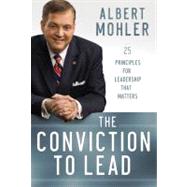
| Acknowledgments | p. 13 |
| The Conviction to Lead | p. 15 |
| True Leadership Starts With a Purpose, Not a Plan | |
| Leading Is Believing | p. 21 |
| The Leader Is Driven by Beliefs That Lead to Action | |
| Convictional Intelligence | p. 29 |
| The Leader Develops the Capacity to Think in Convictional Terms and Leads Followers to Do the Same | |
| Leadership Is Narrative | p. 37 |
| The Leader Draws Followers Into a Story That Frames All of Life | |
| Leaders Understand Worldviews | p. 43 |
| The Leader Shapes the Worldview of Followers | |
| The Passion to Lead | p. 51 |
| Passionate Leaders Driven by Passionate Beliefs Draw Passionate Followers | |
| Leaders Are Thinkers | p. 59 |
| Leadership Begins When You Learn to Think Like a Leader, and Leadership Is Not Achieved Until Followers Learn to Think as Well | |
| Leaders Are Teachers | p. 67 |
| The Effective Leader Is the Master Teacher Within a Learning Organization | |
| Leadership Is All About Character | p. 75 |
| Leaders Are Trusted When Their Lives Are in Alignment With Their Convictions | |
| Leadership and Credibility | p. 83 |
| Leadership Happens When Character and Competence Are Combined | |
| Leaders Are Communicators | p. 91 |
| The Leader's Most Essential Skill Is the Ability to Communicate … Over and Over Again | |
| Leaders Are Readers | p. 99 |
| When You Find a Leader, You Find a Reader, and for Good Reason | |
| The Leader and Power | p. 107 |
| The Faithful Leader Knows That Power Is Never an End in Itself | |
| Leaders Are Managers | p. 115 |
| Not All Managers Are Leaders, but All Leaders Are Managers | |
| Leaders Are Speakers | p. 123 |
| Leaders Give Voice to Conviction and Mobilize Hearts and Minds With a Message | |
| Leadership as Stewardship | p. 133 |
| Leaders Never Lead for Themselves; They Are Stewards in Service of Another | |
| The Leader as Decision Maker | p. 141 |
| Organizations Expect Many Things From Leaders, Most of All the Trusted Ability to Decide | |
| The Moral Virtues of Leadership | p. 149 |
| Leadership and Morality Are Inseparable | |
| The Leader and the Media | p. 157 |
| The Medium Is Not the Message, You Are-and the Leader Must Know How to Deliver That Message | |
| The Leader as Writer | p. 167 |
| The Written Word Remains One of the Most Powerful Ways to Lead, so Leaders Write | |
| The Digital Leader | p. 175 |
| Leaders Understand That the Digital World Is a Real World-a World in Which They Are Called to Lead | |
| The Leader and Time | p. 183 |
| Leaders Know That Time Is the Great Equalizer of Humanity | |
| Leadership That Endures | p. 191 |
| The Leader's Goal Is Not Only to Last but to Endure | |
| The Leader and Death | p. 199 |
| Mortality Frames the Horizon of Leadership | |
| The Leader's Legacy | p. 207 |
| In the End, the Leader's Goal Is to Leave a Lasting Imprint | |
| Notes | p. 215 |
| Table of Contents provided by Ingram. All Rights Reserved. |
The New copy of this book will include any supplemental materials advertised. Please check the title of the book to determine if it should include any access cards, study guides, lab manuals, CDs, etc.
The Used, Rental and eBook copies of this book are not guaranteed to include any supplemental materials. Typically, only the book itself is included. This is true even if the title states it includes any access cards, study guides, lab manuals, CDs, etc.